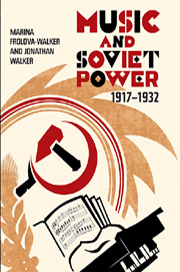Book contents
- Frontmatter
- Contents
- Preface
- Acknowledgements
- Note on transliteration
- Chronology of Political and Musical Events
- October 1917–18: Out of Chaos
- 1919: Depression and Fever
- 1920: Bureaucracy on the Rise
- 1921: Should I stay or should I go?
- 1922: Just Like the Old Days?
- 1923: The Birth of ASM and RAPM
- 1924: ASM in the Ascendant
- 1925: Equilibrium
- 1926: Guests from the West
- 1927: Celebrations
- 1928: At the Crossroads
- 1929: Velikiy perelom – The Great Turning Point
- 1930: RAPM's Glorious Year?
- 1931: RAPM's Fortunes Turning
- 1932: The Rules Change
- Key to Acronyms and Institutional Bodies
- Glossary of Names
- Bibliography
- Index
1920: Bureaucracy on the Rise
Published online by Cambridge University Press: 05 April 2013
- Frontmatter
- Contents
- Preface
- Acknowledgements
- Note on transliteration
- Chronology of Political and Musical Events
- October 1917–18: Out of Chaos
- 1919: Depression and Fever
- 1920: Bureaucracy on the Rise
- 1921: Should I stay or should I go?
- 1922: Just Like the Old Days?
- 1923: The Birth of ASM and RAPM
- 1924: ASM in the Ascendant
- 1925: Equilibrium
- 1926: Guests from the West
- 1927: Celebrations
- 1928: At the Crossroads
- 1929: Velikiy perelom – The Great Turning Point
- 1930: RAPM's Glorious Year?
- 1931: RAPM's Fortunes Turning
- 1932: The Rules Change
- Key to Acronyms and Institutional Bodies
- Glossary of Names
- Bibliography
- Index
Summary
Musical life here is organised by anyone and everyone. There are no less than four main institutions: MUZO (the Music Section of Narkompros), MONO (the Moscow Department of People's Education), Proletkult and the Academy Theatres. But to this we must add TEO (the Theatre Section of Narkompros), which is also in charge of music, and all the military institutions, all the clubs, and many others. […] A terrible hostility and competition can be noticed among them, and this is very much at odds with the goals of the Soviet power. We think that the overlaps could be forgiven, if it were not for the mutual hatred and the desire of each organisation to monopolise music for its own benefit.
Thus wrote a weary Leonid Sabaneyev, commenting on an emerging pattern in the organisation of Soviet musical life – a pattern that was never eradicated even under Stalinist centralisation in the 1930s. The desire for more efficient organisation and more thorough control in fact led to a proliferation of institutions with overlapping remits and ill-defined relationships, all competing for the same tranche of government funds. In November of 1920, for example, a new organisation was created to ‘unify all work in political education and agitation’, namely Glavpolitprosvet, which served as a Political Education section within Narkompros.
- Type
- Chapter
- Information
- Music and Soviet Power, 1917–1932 , pp. 37 - 53Publisher: Boydell & BrewerPrint publication year: 2012



